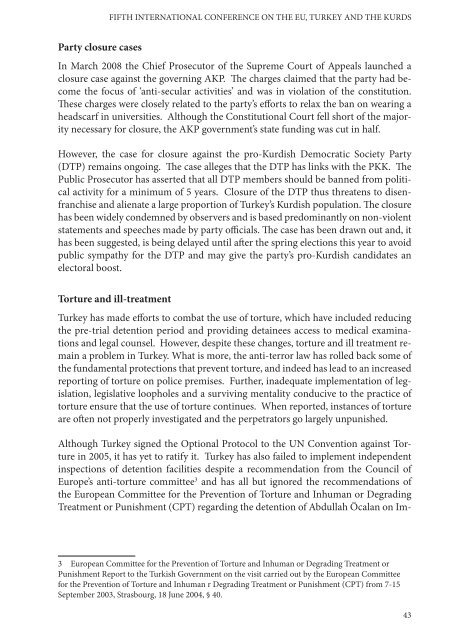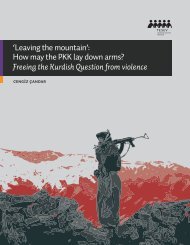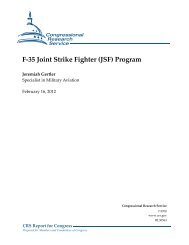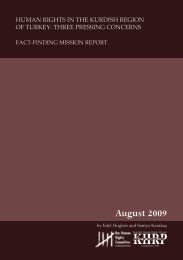FIFTH INTERNATIONAL CONFERENCE ON THE EU TURKEY AND THE KURDS
fifth international conference on the eu, turkey and the kurds
fifth international conference on the eu, turkey and the kurds
You also want an ePaper? Increase the reach of your titles
YUMPU automatically turns print PDFs into web optimized ePapers that Google loves.
<strong>FIFTH</strong> <strong>INTERNATI<strong>ON</strong>AL</strong> <strong>C<strong>ON</strong>FERENCE</strong> <strong>ON</strong> <strong>THE</strong> <strong>EU</strong>, <strong>TURKEY</strong> <strong>AND</strong> <strong>THE</strong> <strong>KURDS</strong><br />
Party closure cases<br />
In March 2008 the Chief Prosecutor of the Supreme Court of Appeals launched a<br />
closure case against the governing AKP. The charges claimed that the party had become<br />
the focus of ‘anti-secular activities’ and was in violation of the constitution.<br />
These charges were closely related to the party’s efforts to relax the ban on wearing a<br />
headscarf in universities. Although the Constitutional Court fell short of the majority<br />
necessary for closure, the AKP government’s state funding was cut in half.<br />
However, the case for closure against the pro-Kurdish Democratic Society Party<br />
(DTP) remains ongoing. The case alleges that the DTP has links with the PKK. The<br />
Public Prosecutor has asserted that all DTP members should be banned from political<br />
activity for a minimum of 5 years. Closure of the DTP thus threatens to disenfranchise<br />
and alienate a large proportion of Turkey’s Kurdish population. The closure<br />
has been widely condemned by observers and is based predominantly on non-violent<br />
statements and speeches made by party officials. The case has been drawn out and, it<br />
has been suggested, is being delayed until after the spring elections this year to avoid<br />
public sympathy for the DTP and may give the party’s pro-Kurdish candidates an<br />
electoral boost.<br />
Torture and ill-treatment<br />
Turkey has made efforts to combat the use of torture, which have included reducing<br />
the pre-trial detention period and providing detainees access to medical examinations<br />
and legal counsel. However, despite these changes, torture and ill treatment remain<br />
a problem in Turkey. What is more, the anti-terror law has rolled back some of<br />
the fundamental protections that prevent torture, and indeed has lead to an increased<br />
reporting of torture on police premises. Further, inadequate implementation of legislation,<br />
legislative loopholes and a surviving mentality conducive to the practice of<br />
torture ensure that the use of torture continues. When reported, instances of torture<br />
are often not properly investigated and the perpetrators go largely unpunished.<br />
Although Turkey signed the Optional Protocol to the UN Convention against Torture<br />
in 2005, it has yet to ratify it. Turkey has also failed to implement independent<br />
inspections of detention facilities despite a recommendation from the Council of<br />
Europe’s anti-torture committee 3 and has all but ignored the recommendations of<br />
the European Committee for the Prevention of Torture and Inhuman or Degrading<br />
Treatment or Punishment (CPT) regarding the detention of Abdullah Öcalan on Im-<br />
3 European Committee for the Prevention of Torture and Inhuman or Degrading Treatment or<br />
Punishment Report to the Turkish Government on the visit carried out by the European Committee<br />
for the Prevention of Torture and Inhuman r Degrading Treatment or Punishment (CPT) from 7-15<br />
September 2003, Strasbourg, 18 June 2004, § 40.<br />
43





